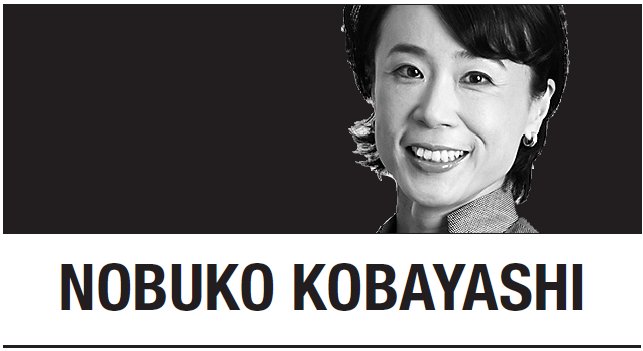[Nobuko Kobayashi] Women and foreigners won’t save Japan Inc.
By BloombergPublished : June 28, 2018 - 17:28
 As Japanese investors flock to annual general meetings this week -- more than 400 of them on June 28 alone -- they’ll have new yardsticks by which to measure performance. The Tokyo Stock Exchange and the Financial Services Agency added two new recommendations to the corporate governance code this month: to re-evaluate complex cross-shareholdings and to push for greater diversity on boards, most notably by adding more women and non-Japanese directors. While the code doesn’t specify numerical targets, the administration of Prime Minister Shinzo Abe has echoed the message by urging all public companies to have at least one woman director.
As Japanese investors flock to annual general meetings this week -- more than 400 of them on June 28 alone -- they’ll have new yardsticks by which to measure performance. The Tokyo Stock Exchange and the Financial Services Agency added two new recommendations to the corporate governance code this month: to re-evaluate complex cross-shareholdings and to push for greater diversity on boards, most notably by adding more women and non-Japanese directors. While the code doesn’t specify numerical targets, the administration of Prime Minister Shinzo Abe has echoed the message by urging all public companies to have at least one woman director.The focus on “women and foreigners” is understandable, given how poorly they’re currently represented on Japanese boards. Among the roughly 2,000 companies listed in the TSE’s first section, women filled only 10.6 percent of director positions, according to ProNed, compared to an average of 20 percent to 30 percent among Western companies. Non-Japanese fared even worse in a 2018 A.T. Kearney study, accounting for just over 1 percent of directors.
It’s important to remember, however, exactly why Japanese companies require greater diversity. Before Japan’s bubble burst in the early 1990s, Japanese management was touted as the world’s best despite being even more homogenous than now. In fact, many observers attributed the success of Japan Inc. precisely to its lack of diversity. Companies thrived by manufacturing superior products at a lower cost than competitors, fueling Japan’s export model. Their efforts were powered by a workforce of diligent salarymen who stuck loyally with their employers and climbed through the ranks, hoping to be rewarded with a board position once they reached their sixties.
In today’s faster-moving, more complex world, monocultures such as these have struggled to come up with timely, well-differentiated corporate strategies. Narrow sector knowledge is no longer sufficient as digital technologies allow competitors to spring up from nowhere, instantly. One Japanese consumer goods company spent a year playing catch-up after a rival released a groundbreaking new product. Company leaders, all homegrown executives, had been confident that they “knew” their customers. They were wrong.
Competing on innovation requires the collision of different ideas in the boardroom and among management ranks. Facing a mature and shrinking domestic market, Japan Inc. has also diversified geographically through mergers and acquisitions. Overseas revenue of the companies in the TSE’s first section increased from 32 percent of the total in 1997 to 44 percent in 2017.
Given all this, what Japanese companies really need is diversity in sector expertise, thinking styles and geographical experience.
“Women and foreigners” can fill some of this need. Some might say that women don’t necessarily think differently than men; new research testing the “Lehman Sisters hypothesis” -- that the ill-starred investment bank wouldn’t have failed if it had had more women in management ranks -- shows little difference in risk-taking appetite between men and women in top positions in finance. I’d argue that because women executives typically have spent their careers as minorities in Japanese companies, they have a unique perspective to offer. Besides, having more women on boards sends a good signal to others that the path to promotion is open.
The case for non-Japanese board members is even more straightforward. Whether serving as inside or outside directors, their perspectives and local networks can complement whatever management structures are put in place to liaise with overseas entities. For instance, having been raised in a less litigious society, Japanese managers may be ill-prepared to deal with the legal complexities of certain mergers, as in the Fujifilm vs. Icahn case. An experienced outsider on the board can raise red flags in a timely fashion.
As corporate ambitions vary, however, no two companies have the same needs in terms of diversity. The first step is to judge the makeup of the current board by the kinds of perspectives the company is lacking. Some firms might want to introduce knowledge of a particular field, others a new thinking style or experience in a particular geography. In some cases, the need may be demographic -- for younger voices more attuned to digital trends, for instance. A Japanese national raised abroad may add more value than a non-Japanese academic without the right kind of sector expertise.
Once managers decide on their priorities, they can and should be creative in addressing them. When it comes to diversity, what counts is the substance, not the gender or the passport.
Nobuko Kobayashi
Nobuko Kobayashi is a partner in management consulting firm A.T. Kearney’s consumer goods and retail practice. -- Ed.
(Bloomberg)

















![[KH Explains] Hyundai's full hybrid edge to pay off amid slow transition to pure EVs](http://res.heraldm.com/phpwas/restmb_idxmake.php?idx=652&simg=/content/image/2024/04/18/20240418050645_0.jpg&u=20240419100350)

